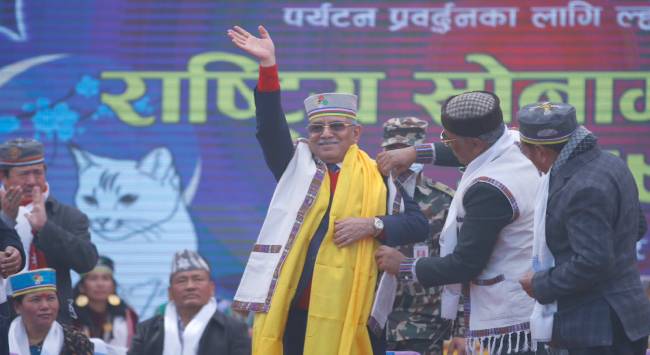Summary
The primary reason for the recent break in the alliance between the Communist Party of Nepal (Maoist Centre) and the Communist Party of Nepal (Unified Marxist-Leninist) is Pushpa Kamal Dahal’s support for the Nepali Congress’ candidate in the 9 March 2023 presidential election. India, China and the United States are also keenly observing political developments in Nepal.
On 27 February 2023, 10 days before the presidential election, the Communist Party of Nepal (Unified Marxist-Leninist) [CPN (UML)] withdrew its support from the Pushpa Kamal Dahal-led government. An immediate reason that seems to have triggered the decision to quit the government was Dahal stopping CPN (UML) leader and Foreign Minister of Nepal, Bimala Rai Paudyal, hours before she was to fly to Geneva to participate in the 52nd regular session of the United Nations Human Rights Council on 27 February 2023. This episode occurred two days after the Rastriya Prajatantra Party (RPP) withdrew its support for Dahal’s government, citing “change in the political equation and cooperation within the ruling government”.
Cracks developed between the Communist Party of Nepal (Maoist Centre) [CPN (Maoist Centre)] and CPN (UML) over the 9 March 2023 presidential election. CPN (Maoist Centre) spoke of forging a national consensus on the presidential candidate. However, on 25 February 2023, Dahal declared that his party would support the Nepali Congress’ (NC) candidate, Ram Chandra Paudel. CPN (UML) decided to choose its Vice Chairman, Subash Chandra Nemwang, as the presidential candidate.
The President of Nepal is elected by an electoral college consisting of members of the federal parliament and provincial assemblies. There are 884 members in the electoral college, including 275 from the House of Representatives, 59 from the National Assembly and 550 from the seven provincial assemblies. A vote cast by a member of the federal parliament carries a weight of 79 votes, whereas a vote cast by a member of a provincial assembly weighs 48 votes. At present, the total vote weightage is 52,786, if no seat in the federal parliament and provincial assembly is vacant. Ram Chandra Paudel, with support from eight political parties, is likely to receive 31,711 vote weightage, which is more than sufficient to secure victory. Paudel has the support of the NC (16,142 vote weightage), CPN (Maoist Centre) [7,649 vote weightage], Janata Samajbadi Party (2,066 vote weightage), Janamat Party (1,242 vote weightage), Nagarik Unmukti Party (813 vote weightage), the Communist Party of Nepal (Unified Socialist) [CPN (US)] (2,622 vote weightage), Loktantrik Samajbadi Party (971 vote weightage) and Rastriya Janamorcha (206 vote weightage).
Several countries have also shown interest in the Nepal presidential election. Before the meeting between Dahal and CPN (UML) Chairperson, K P Sharma Oli, on 24 February 2023, China’s Ambassador Chen Song, during his meeting with Dahal, as reported, urged for cooperation among the left parties, particularly between CPN (UML) and CPN (Maoist Centre), “ahead of the presidential election”. This was, however, denied by the media advisor to Dahal, Manahari Timilsina, who said, “The Chinese ambassador met the prime minister to invite him to participate in the Boao Forum to be held in the Hainan Province of China in late March”. The Chinese ambassador also met Madhav Nepal, Chairman of another communist party, CPN (US).
On 13 and 14 February 2023, India’s Foreign Secretary, Vinay Mohan Kwatra, visited Nepal. He met with his Nepali counterpart, Bharat Raj Paudyal, and the two discussed various areas of bilateral cooperation. Kwatra also met Dahal, Oli and leaders of the different political parties, in what appears to be, an assessment of the situation before the presidential election. Speaking in parliament, Chitra Bahadur K C, Chair of Rastriya Janamorcha, referred to Kwatra’s visit and said, “foreign forces are directly intervening to influence the upcoming presidential election”.
Finally, since Dahal assumed office on 26 December 2022, Kathmandu has hosted important US officials such as the Undersecretary of State for Political Affairs, Victoria Nuland, US Agency for International Development, Samantha Power, and Deputy Assistant Secretary of State (for the South and Central Asian Affairs Bureau), Afreen Akhter. The Central Intelligence Agency’s Director, William Joseph Burns, was to visit Nepal on 15 and 16 February 2023 but Kathmandu denied him permission, citing the presidential election.
As the CPN (UML) and RPP withdrew their support from the government, Dahal needs to obtain a vote of confidence in the parliament by the end of March 2023. Tika Pradhan, a senior political correspondent with The Kathmandu Post, wrote that the top leadership of the NC, CPN (Maoist Centre) and CPN (US) have a tacit understanding to rotate the prime ministership between them. However, given the nature of politics and factionalism in Nepal, nothing is certain. To add to Dahal’s political problems, on 5 March 2023, Nepal’s Supreme Court ordered its administration to register two writ petitions against him for claiming responsibility three years ago for 5,000 deaths during the insurgency period. On the external front, the Chinese ambassador’s reported statement, and the visit by Kwatra and the US officials in February 2023 underscores the growing geopolitical significance of Kathmandu.
. . . . .
Dr Amit Ranjan is a Research Fellow at the Institute of South Asian Studies (ISAS), an autonomous research institute in the National University of Singapore (NUS). He can be contacted at isasar@nus.edu.sg. The author bears full responsibility for the facts cited and opinions expressed in this paper.
Pic Credit: PMO Nepal’s Twitter Account.
-
 More From :
More From :
-
 Tags :
Tags :
-
 Download PDF
Download PDF


